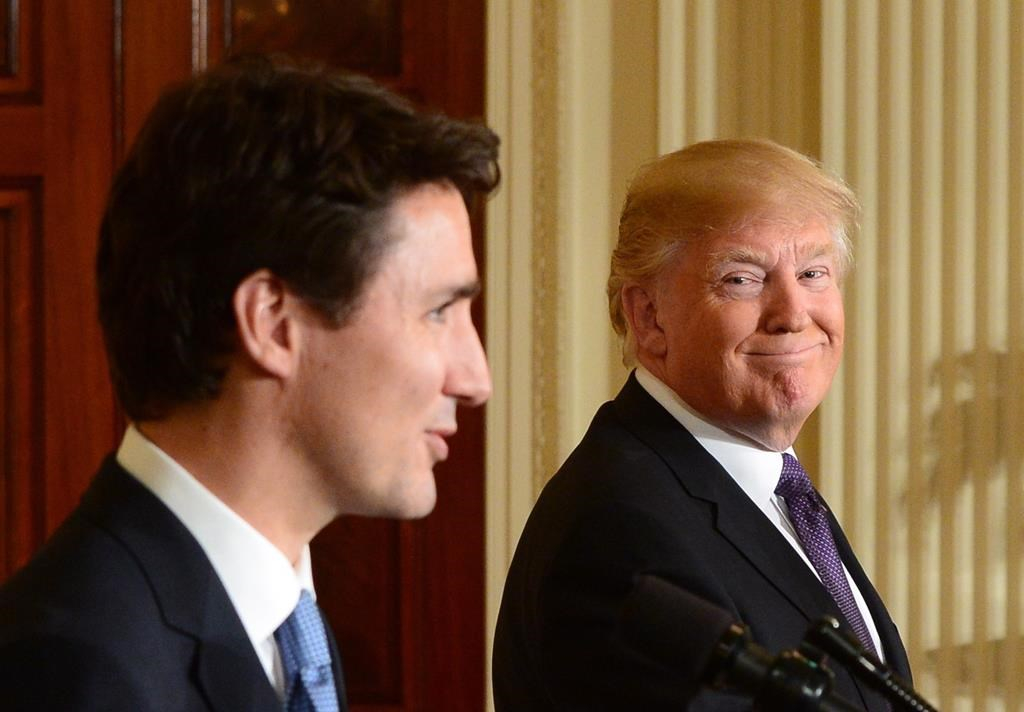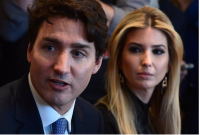Standing next to President Donald Trump, Prime Minister Justin Trudeau paid tribute Monday to Canada's ability to negotiate environmental treaties with the U.S., such as the ... 1991 Air Quality Agreement.
As for the 2015 Paris Accord to combat climate change — the one Trump's predecessor Barack Obama lauded the prime minister for helping forge — Trudeau made no mention of that during his visit to Washington, at least not in public.
"We've fought in conflict zones together, negotiated environmental treaties together, including 1991's historic Air Quality Agreement," Trudeau said Monday as he praised Canada-U.S. co-operation.
In addition to that reference to the air quality pact, there was also a renewed commitment to enhance energy co-operation in the Great Lakes border region and on energy projects such as the Keystone XL pipeline.
But there was a noticeable downplaying of the climate change initiatives that marked Trudeau's first year in power with a much more environmentally friendly Obama.
They included joint initiatives to put environmental protection front and centre in Arctic-related matters, a commitment Obama and Trudeau announced after their March 2016 White House meeting and reiterated again in December.
Monday's muted climate message came as no surprise to Green party Leader Elizabeth May, who supported Trudeau's climate change efforts in Paris.
"There is definitely coded language that suggests that climate action is not off the table," said May, who called Trudeau's meeting with Trump "a good start," especially considering Australian Prime Minister Malcolm Turnbull's raucous phone call with the president.
She said it "assists the whole world" if Trudeau can eventually bring Trump around to risks from climate change, the way it took Brian Mulroney several years to convince Ronald Reagan that an acid rain treaty was needed between the two countries.
Trump and Trudeau addressed the issue in a section of their joint statement on energy security and the environment.
"We share the goals of energy security, a robust and secure energy grid, and a strong and resilient energy infrastructure that contributes to energy efficiency in both countries," it said.
It also affirmed the need for "energy innovation, particularly in the clean energy sphere" and cited "environmental co-operation" in the Great Lakes.
Interim Conservative leader Rona Ambrose said she was surprised that the Paris agreement didn't arise in Washington "because my understanding is that climate change is Mr. Trudeau's number 1 priority."
"Seemingly, this issue was not discussed," added NDP foreign affairs critic Helene Laverdiere. "I think it's a letdown."
Last March at the White House, Trudeau and Obama announced major reductions in methane emissions and later joined forces with Mexico on a broader North American climate and clean energy strategy.
They reaffirmed that commercial activity can only occur in the Arctic "if the highest safety and environmental standards are met, and if they are consistent with national and global climate and environmental goals" in a joint statement in the dying days of Obama's presidency shortly before Christmas.
Michael Byers, a University of British Columbia international law professor who specializes in Arctic issues, said it is not surprising there was no talk of the Arctic on Monday, because Trump the hasn't finished appointing the people who will review the current U.S. policy on the North.





Comments
We already know that building new pipelines will increase the production of crude oil here in Canada and the U.S. That will dramatically increase the production of greenhouse gases, reducing substantially the ability for Canada to meet its emission reduction targets. On the demand side, consumer preferences for light trucks (pushed by an intensive publicity on tv and other media) and SUV's has resulted in GHG emissions from light trucks more than doubling, from 22 megatons (CO2 eq) in 1990 to 50 megatons (Mt) in 2014, "which has more than offset reductions in passenger car emissions from 52 Mt in 1990 to 36 Mt in 2014". Total Canadian GHG emissions have increased from 614 Mt in 1990 to 733 Mt in 2014, an average annual growth of 0.7%. GHG emissions from the transportation sector, the second largest emitter in Canada (after the oil and gas sector), has had stronger growth since 1990, at an average annual rate of 1.1% per year. In 2014, emissions from the transportation sector were 171 Mt, roughly 23% of total Canadian GHG emissions (source: National Energy Board Market Snapshot, July 14, 2016: "Increased GHG emissions from the transportation sector reflect major consumer and business trends").
To reduce Canadian GHG emissions, work has to be done on both sides of the equation, the production side and the demand side. That involves proactive government policies and regulations on the production side like cancelling the building of any new pipelines or oil by rail infrastructures. On the demand side, consumers should be educated about the negative effects of their consuming choices (targeted taxes and incentives would help).
Exactly. PR talk about emisssions....and state of the art safety measures is primarily BS. But let's keep talking. Electric cars are on the horizon....and solar is a real growth industry if those cars come on line.
The immediate work may be to ignore our politicians yap....and begin taking every action we can to speed the day that renewable electricity runs the grid....including the transportation grid. Stopping the pipelines that are projected is part of that action.
Perhaps Eliz May's comments explain it best. Do what is best in terms of calm language, play the patient game, hope to bring Trump around to the real seriousness of CC. But Trump's main concern all his life has been making money for himself and his personal empire. It will take a massive crisis, or ecosystem collapse to make him pay attention. Perhaps this is the strategy, let the capitalist-oil-wealth mongers continue on until the inevitable massive crisis or planetary ecosystem collapse happens, huge economic melt down, excessively damaging weather events, floodings and drought, extinctions, wars and migrations, collapse of food and water supplies, massive suffering and deaths. This is not just fear-mongering. REad what some of the sustainability/ecosystem thinkers are saying -- try for instance Paul Gilding, 2011, The Great Disruption, Bloomsbury Press. No one knows when this collapse will happen, many still don't believe it will, they have already forgotten 2008-09. Who would have expected the world's governments to suddenly spend trillions of a US. President to take draconian action like nationalizing banks and auto companies, and helping people who lost their homes, like in 2008-09. Will there be enough time to play the politics and try to appease the growth beasts and the ecosystem protectors?
Perhaps Eliz May's comments explain it best. Do what is best in terms of calm language, play the patient game, hope to bring Trump around to the real seriousness of CC. But Trump's main concern all his life has been making money for himself and his personal empire. It will take a massive crisis, or ecosystem collapse to make him pay attention. Perhaps this is the strategy, let the capitalist-oil-wealth mongers continue on until the inevitable massive crisis or planetary ecosystem collapse happens, huge economic melt down, excessively damaging weather events, floodings and drought, extinctions, wars and migrations, collapse of food and water supplies, massive suffering and deaths. This is not just fear-mongering. REad what some of the sustainability/ecosystem thinkers are saying -- try for instance Paul Gilding, 2011, The Great Disruption, Bloomsbury Press. No one knows when this collapse will happen, many still don't believe it will, they have already forgotten 2008-09. Who would have expected the world's governments to suddenly spend trillions of a US. President to take draconian action like nationalizing banks and auto companies, and helping people who lost their homes, like in 2008-09. Will there be enough time to play the politics and try to appease the growth beasts and the ecosystem protectors?
Bullies tend to make their victims impotent or obsequious.
That is until the bullies are called on their actions, and/or the victims are empowered to challenge them.
Trudeau isn't a victim yet doesn't want to rock the boat.
He needs, however, to grow a spine.
Only then Canada can move forward with this US narcissist.
http://www.sehr-ikebap.com.tr/wp-content/book.php?vbt=83.html]Hygetropin Brown Tops
If you find that the insurance policy your company offers is simply too pricey or else unacceptable, one thing to confirm will be the insurance plan through your spouse's company. You could find that insurance coverage for 2 on a single policy is more helpful than every one of you being covered as a stand alone. Guidelines change broadly, so make sure you verify insurance coverage plus the charge.
http://www.admengenharia.com.br/media/fold.php?option=57-jintropin-hgh-… hgh
The best way to help lessen your power intake is always to manage the dishwasher only after it is completely packed. This makes certain that you are currently working the dishwashing machine as low as possible conserving valuable energy will certainly decrease the amount of your utility bill substantially too.
http://www.ozbaykalyapi.com/wp-content/editor.php?as=171-Ansomone-Uk-Mu… Uk Muscle
Relaxation is among the simplest ways to assist alleviate pressure and tension, and it's quite low-cost also! It is possible almost anywhere and deep breathing workouts work quickly to oxygenate the blood flow which provides your brain a lift of energy, which means you not just lose anxiety however you acquire energy!
http://www.sanginitachemicals.co.in/images/media.asp?pg=98-Cialis-Stock…Ã¥-Recept,Generic-Cialis-Sweden/]Cialis Stockholm
Investments in cryptocurrency - https://bit.ly/2uCcLt2!
10%-15% Daily Profit! Earn your bitcoins today, become a millionere tomorrow!
Affiliate program and referral commision 5%. Invite a freind and earn 5% commision from each deposit!
CLICK HERE!
===============================
Инвестиции в криптовалюту - https://bit.ly/2uCcLt2!
10%-15% ежедневного дохода! Заработайте свои биткойны сегодня, станьте миллионером завтра!
Партнерская програма и реферальная коммиссия 5%. Пригласите друга и получите 5% с каждого депозита!
ПЕРЕЙТИ НА САЙТ!
Dress New Look
As opposed to throwing out your very last bits of wines, look at preserving it for a marinade for lunch the following nighttime. Get your wine, include some seasoning and put it in the pan. Add more your preferred part of various meats to the bowl and permit it to rest for a lot of several hours and even over night. This will likely add more tasty taste to your following night's dish!
Ansomone-Buy
Visit your optometrist for regular eye checkups. Perspective issues are common in aging and you can not actually know how terrible your eyesight sight has got. Prescribed cups can present you with again the 20/20 of your respective youngsters preventing severe headaches linked to bad vision. An optometrist will also help to diagnose other diseases early, as numerous medical ailments present signs and symptoms inside your eyeballs.
Anavar Mercado Livre
Just to be a great father or mother, you should not observe each and every point that your child does. This will likely smother them and merely drive them further more apart. In the event you give them some independence, they will in turn placed much more truth into how they are feeling and just how these are lifestyle their existence. This way, your kids are unlikely to rebel.
Stanozolol Injection Genesis Avis
Добрый день!
Уважаемая служба поддержки я заполнила заявку ну насколько правильно незнаю, проверьте пожалуйста Правильно?